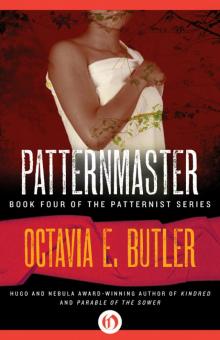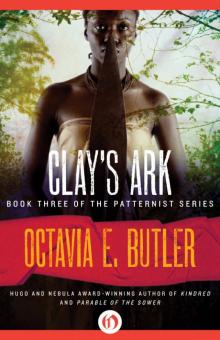- Home
- Octavia E. Butler
Patternmaster Page 2
Patternmaster Read online
Page 2
Iray caught her breath sharply. “To visit Coransee! Joachim, is he your friend? So powerful a lord.” She was a child about half the time.
There was a pause before Joachim answered, then, “I know him.” He sounded almost bitter. “We’re not friends, but I know him.”
As the strongest Housemaster in the sector, Coransee was a kind of unofficial local leader. That made him a celebrity to people like Iray. Teray had heard him spoken of with admiration and envy, but never with bitterness. But then, Teray had been shut away in the school and people were careful what they said before schoolchildren. Well, he was out of school now. It would be best for him to know something more about the Housemaster he was about to visit. “Joachim?” he called.
Joachim dropped back to ride beside Teray, leaving Jer to lead. You’d better make it “Lord Joachim,” Teray. For the rest of the day. And definitely “Lord Coransee.” He values formality.
Teray accepted this with interest. It was the first nonvocal communication he had had with Joachim this morning, and it was nonvocal only to emphasize its seriousness. It was an order, and a warning.
Joachim went on and Teray realized that he was reaching Iray too. Be introduced to him with Jer and me, then drift away among his women and outsiders.
“Joachim, what is it?” Iray asked.
Joachim looked at her silently, until she corrected herself.
“Lord Joachim.”
“Sector politics,” Joachim said aloud. “Nothing more.” And he again took his place beside Jer.
Teray watched him, wondering at his sudden reticence. Now Teray had more questions than ever. But Joachim’s silence was a closed one. It did not invite questions.
By midday they had reached Coransee’s House. It was a four-story mansion, columned, ancient, ornate, surrounded by well-landscaped grounds and flanked by outbuildings. It had been built on a hill and was visible for miles. Teray could see why it was the envy of many lesser lords, and why Coransee had risked fighting a duel for it several years before. To get it, he had had to kill a powerful woman who had held it for over two decades. In school, Teray had seen pictures of ancient palaces that were probably smaller. Teray gazed out over Coransee’s land, seeing the side pastures and the grazing horses and cattle. Coransee supplied the sector with most of its meat and its riding animals. The small herd that Joachim kept had never been more than a hobby.
Two mutes hurried from one of the outbuildings to greet the four newcomers politely and take their horses. As Joachim led the way to the House, he warned Teray and Iray once more:
“Both of you remember what I told you. Take up with a woman, an outsider, even a mute, and get out of the way fast. I’ll make it as easy as I can for you.”
Teray nodded and Joachim led them inside.
There were several women and outsiders seated and standing near the fireplace of the huge common room in which Teray found himself. Before Teray could decide what they were doing, one of them sent the informing thought, He knows you’re here. He’s coming.
Joachim acknowledged with thanks and sat down. The others followed his example. Their wait was not long.
The atmosphere of the room changed, grew tense as Coransee entered. The Housemaster radiated power in the way of a man not only confident but arrogant. A man who meant for people to stand in awe of him. A man Teray disliked instantly The Pattern told Teray that he and Coransee were temperamentally incompatible. They could be said to be far apart in the Pattern. The reason for the distance might have been great temperamental dissimilarity, or dangerous similarity—similar inclinations toward dishonesty or greed, for instance. Whatever it was, it separated Teray and Coransee definitely, thoroughly.
The four visitors stood up as the Housemaster entered. Coransee was a big man, tall, well-muscled, but without the heavy, stocky look of Joachim. Teray found himself staring at Coransee’s long cold face with a feeling that disturbed him because it was gone before he could recognize it. It took him a moment to realize that Coransee was looking at him in the same way. But Coransee was slower to cover his reaction. Teray had time to wonder whether what he had seen in the Housemaster’s eyes, and for an instant in his thoughts, was recognition. But whatever it was, it faded quickly into puzzlement. Then Coransee’s shield snapped into place and Teray got nothing more. Reflexively, Teray shielded his own thoughts but behind his shield he continued to wonder.
Suddenly, as though in attack, Coransee drove his massive mental strength hard against Teray’s shield. He meant to break through it. There was no doubt of that. He had apparently seen something in Teray’s thoughts that caught his attention. He wanted another look, he did not get it; Teray’s shield held firm. Before Teray could respond to the unprovoked attack. Joachim spoke up angrily.
“Coransee! My apprentice is a guest in your House. He’s given you no offense. What’s the matter with you?”
For a moment Coransee stared at him in cold anger, stared at him as though he was an unwelcome intruder breaking into a private conversation. “Nothing is the matter,” he said finally. “Your apprentice is a very able young man. I think I may have seen him before—perhaps in one of my visits to the school.”
Joachim gave Teray no time to deny this. “You may have,” he said. “Although I can’t see why that would be reason for you to attack him now.” Joachim took a deep breath, calmed himself. “His name is Teray. This is his wife Iray, and my outsider Jer.”
Coransee nodded, acknowledging all three introductions at once. But his attention had fastened on Teray.
“Teray,” he repeated, drawing the word out thoughtfully. “How did you happen to choose a name ending in ‘ray,’ boy?”
The “boy” rankled, but Teray pretended to ignore it. “I’m told that I’m one of the sons of Patternmaster Rayal,” he answered. His name had attracted attention before but he had fought for it and won the right to keep it while still in school.
“Rayal?” Coransee raised an eyebrow. “Rayal’s children must number in the hundreds by now. But you’re the first I’ve found who thought himself worthy to take his father’s name.”
Teray shrugged. “An adult is free to take any name. I chose to share my father’s.”
“And cause your wife to share it too, I see.”
“No, Lord. She came to me freely and chose her own name.”
“Did she.” Coransee’s attention seemed to wander. He had relaxed slightly, thinning his total shield down to a more comfortable heavy screen. For a moment, something flickered so close to the surface of his thoughts that Teray almost had it. He could have had it if he had dared to be obvious about his probing. But he let it pass. Abruptly, Coransee changed the subject.
“Joachim, I have an artist for you.”
The sudden switch obviously surprised Joachim as much as it did Teray. But Joachim was cautiously enthusiastic. “An artist? I’ve been around the sector looking for a good one to work with some of my outsiders.”
“I know.” For the first time, Coransee smiled. “And this one is special. Sensitive. Fantastically sensitive.”
Joachim began to draw in even his cautious enthusiasm. “They’re usually more than a little crazy when they’re too sensitive. They don’t have enough control of their ability to receive selectively.”
“Oh, this boy has all the control he needs. Picks up latent images from anybody—Patternists, mutes, animals, even Clayarks. How many artists do you know who can lay their hands on a boulder that a Clayark has leaned against and read you the story of that Clayark’s life?”
“Clayarks?”
“Test him.”
“I’ve never had an artist who could pick up Clayark images. Call him.”
Coransee turned toward the group of women and outsiders near the fireplace and called, “Laro!”
One of the outsiders in the group got up at once and came over to Coransee. He was a young man, probably only a few years older than Teray. Short and small-boned, he moved with quick, fluid grace. The Pattern betr
ayed him as a man of little mental strength. However competent he was at his art, he could never be anything more than an outsider. If he was lucky, his talent would buy him a comfortable place in someone else’s House, and he would be troubled by none of the competitive spirit that sent stronger people out to found Houses of their own. If he was unlucky and did have such spirit, it would soon get him killed.
Coransee introduced the artist. “Laro, this is Lord Joachim and some members of his House. His people are artists and craftsmen.”
Laro lowered his head and spoke respectfully. “My Lord.” He was close to Joachim in the Pattern, Teray realized. That meant Joachim would probably buy him. Joachim’s people were able to form themselves into the deadly fighting machine that Clayarks avoided only because Joachim chose them so carefully. He chose them not only for their skill and strength, but for their compatibility within the Pattern. The Pattern was a vast network of mental links that joined every Patternist with the Patternmaster. Its first purpose was supposed to be to give the Patternmaster the strength he needed—strength drawn through the links from the Patternists—to combat large-scale Clayark attacks. Actually, though, the Pattern was more often used as Joachim used it, as Teray was using it now. To judge, roughly, the mental strength of other Patternists, and to judge, more precisely, their compatibility.
Teray brought his attention back to the two Housemasters and realized that Coransee was listing the artist’s accomplishments—doubtless to make the young man look as attractive as possible before they began talking about a price. Neither Housemaster was paying any attention to Teray, and Teray had no interest in the bargaining to come. He touched Iray lightly and started to go over to the group that Laro had left. Iray, evidently remembering Joachim’s instructions, started to follow. Coransee stopped them.
“Teray, Iray, wait.” He smiled again. He had an open, friendly smile that Teray would have trusted on anyone else. “View Laro’s work with us.” A command disguised as an invitation.
Caught, Teray and Iray came back slowly and sat down. Teray watched as the artist went past him and crossed the huge room to the group of women and outsiders that he had just left. From them he took three ceramic figurines and a small painting. Teray realized now why the group had seemed so absorbed. The artist had been entertaining them. Now Joachim’s party was to sample his work.
Laro handed the painting to Joachim. The figurines went to Teray, Iray, and Jer. Teray first thought his was a wild animal. Not until he held it did he realize that the well-muscled four-legged body was human-headed. The thing was a Clayark.
Teray stared at it with interest. He had seen pictures of Clayarks at the school, but nothing as lifelike as this. His hands could almost feel warmth and a texture of flesh.
He folded his hands around the figurine, closed his eyes, and opened his mind to whatever experience awaited him. He expected a jolt. He had prepared himself for it—but not nearly enough.
Abruptly, shockingly, Teray was the Clayark. There was no time for anticipation, no disorientation. He felt himself seized and possessed by the artist-implanted “consciousness” of the figurine. Fortunately, by the time Teray recovered enough to struggle, he had also recovered enough to know that he should not struggle. He was still the Clayark.
He was within a torch-lit cave in the mountains far to the east of Redhill. He could see the rough gray-rock walls and the fire of the torches. He was a member of a munitions clan. His people made the rifles with which other Clayarks hunted food and fought Patternists. Now, though, his mind was not on gun-making. Now he had been challenged.
The sleek young female who stood apart from other onlookers, watching and holding her head so high—she was his. She was the daughter of his mother’s brother, and long promised to him. Only he had a right to her. Not this other, this dog with his long jowly muzzle of a face. The other, the challenger, was big both with fat and with muscle. Years of handling heavy metal weights had given him great strength. And years of stuffing his belly like a pig had made him slow and clumsy. Savagely, the Clayark who was Teray lunged at him.
As the Clayark, Teray bit and punched with heavily calloused hands—or forefeet. He seized and tore and gouged, all the while leaping about with speed and agility that his opponent could not match. All his opponent’s power was in his massive arms. Or forelegs. As long as the Clayark Teray could avoid those arms, he was safe.
Then the Clayark Teray stumbled, and almost fell over a loose rock as he dodged one of his opponent’s clumsy swipes. His hand closed around the rock as he leaped away.
He wheeled and charged again. This time he reared back on hind legs, which were more catlike than human. As his opponent reared eagerly to meet him and finally lay hands on him, Teray smashed the rock against the side of the creature’s head. Then he stood back in triumph and watched while his opponent died.
Teray opened his eyes and stared at the small figurine in his hands. He could see its beauty, its perfection, even more clearly now. What was it the Clayarks called themselves? Sphinxes. Creatures out of ancient mythology, lion-bodied, human-headed. The description was not really accurate. The Clayarks were furless and tailless, and they did possess hands. But they were much more sphinxes—creatures who were at least partly human—than they were the animals Teray had always considered them.
And outsiders were not necessarily the inferior people Teray had considered them. The artist Laro had done something that Rayal himself could not have done. No Patternist could read the mind of a Clayark directly. The disease the Clayarks carried gave them at least that much protection from their Patternist enemies. And only the most sensitive artist could lift latent impressions of Clayarks from objects the Clayarks had touched. Laro not only lifted those impressions, he refined them, amplified them, and implanted them in his figurines and paintings. Teray caught the artist’s attention and sent him silent appreciation. Laro smiled.
Jer and Iray had finished their experiences as Teray had. All three waited now as Joachim gazed silently at the painting. No sign of what he was experiencing appeared on his face, but they all could see that he was completely absorbed in the painting. Finally, Joachim’s show was over and he looked up.
He put down the painting and turned to Coransee, his eagerness barely veiled. “What do you want for him?”
Moments later, in Coransee’s office, Teray, Joachim, Laro, and Coransee himself were seated, waiting for Coransee to name his price. Joachim had tried to send Teray to entertain himself with more of Laro’s work, but Coransee had insisted on his sitting in on the bargaining.
“He’s an apprentice,” the Housemaster had said. “He might as well start learning right now.” Then, about the trade:
“Joachim, I had to trade with another sector to get Laro. He’s a rare find, and I had intended to keep him. He’s not close to me or many of my people in the Pattern, but that’s not as important to me as it is to you. I’ll trade him to you, though, if he agrees to the trade.”
At once, Laro spoke up. “I do agree, Lord. I’ve been content here. I mean no disrespect. But Lord Joachim and his people seem much closer to me in the Pattern.”
Coransee nodded. “That’s what I thought. We trade then, Joachim.”
Joachim leaned back in his chair. “As I asked before, what do you want for him?”
“I trade for strength, as always,” Coransee said. “The success of the last Clayark raid makes it obvious that I don’t have enough.”
“If you were trading with anyone else, I’d advise you to trade for compatibility within the Pattern,” said Joachim. “With more compatibility, you wouldn’t have any of the Clayarks who attacked you still alive and dangerous. But you’re trading with me and I don’t have anyone even close to you in the Pattern.”
“Would you be willing to trade Jer, the outsider you brought with you?” Coransee asked. Teray frowned. It seemed to him that the Housemaster was less serious than he should have been. Teray got the feeling that he had no interest at all in Jer.
>
“Jer’s young,” said Joachim, going along with him. “Only two years past transition. But he has the strength you’re looking for.”
“You would trade Jer?” asked Coransee softly.
“If you wanted him.”
“I don’t, of course.”
“No.”
“I just wondered. You’re sentimental about your people sometimes. But you want this artist. I can see that. You’d trade anyone short of your lead wife for him.”
Joachim looked uncomfortable. Coransee was playing with him. Dangling the artist temptingly before him, but refusing to name a price. And doing it all in a mildly insulting way.
“Coransee, for the third time, will you tell me what you’re trading for?”
“Of course,” said Coransee. “Of course. I offer you Laro for Teray.”
The words were said so casually that it seemed to take Joachim a moment to digest them. More likely, though, Joachim used his moment of “surprised silence” to think of a negative answer that would not close the trading.
Teray looked from one man to the other. He had known what Coransee was going to say just an instant before he said it. Joachim had probably known too. Coransee had been a little too eager, had not concealed his thoughts as carefully as he might have. In his carelessness, he had permitted Teray to learn one other thing—a thing that was somehow part of the reason why the Housemaster wanted Teray badly enough to trade a talent like Laro’s. A talent that had surely cost him several of his people.
But perhaps it would not matter. Already Joachim was turning down the offer.
“Coransee, I’ve told you this man is an apprentice, not an outsider. He’s not my property. In fact, as an apprentice he’s still under the protection of the school. I can’t legally trade him.”
“And you wouldn’t if you could.” Coransee spoke lazily, as though he had gotten the answer he expected and was merely playing another game. “Let’s be realistic, Joachim. You want my artist, I need your apprentice. Laro is much closer to you in the Pattern than Teray is. And law or no law, Teray would have no power to object if you traded him.”

 Patternmaster
Patternmaster Survivor
Survivor Clay's Ark
Clay's Ark Bloodchild and Other Stories
Bloodchild and Other Stories Parable of the Sower
Parable of the Sower Wild Seed
Wild Seed Fledgling
Fledgling Unexpected Stories
Unexpected Stories Kindred
Kindred Lilith's Brood: Dawn / Adulthood Rites / Imago
Lilith's Brood: Dawn / Adulthood Rites / Imago Adulthood Rites
Adulthood Rites Mind of My Mind
Mind of My Mind Seed to Harvest
Seed to Harvest Lilith's Brood: Dawn, Adulthood Rites, and Imago (Xenogenesis Trilogy)
Lilith's Brood: Dawn, Adulthood Rites, and Imago (Xenogenesis Trilogy) Bloodchild
Bloodchild Seed to Harvest: Wild Seed, Mind of My Mind, Clay's Ark, and Patternmaster (Patternist)
Seed to Harvest: Wild Seed, Mind of My Mind, Clay's Ark, and Patternmaster (Patternist)